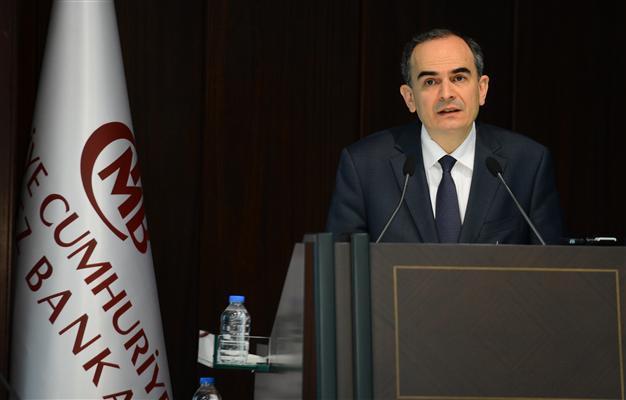Turkey's Central Bank makes massive rate hikes to stem Lira fall
ISTANBUL - Reuters

Turkish Central Bank Gov. Erdem Başçı speaks during a press conference Jan 28. AA photo
Turkey's Central Bank hiked all of its key interest rates in dramatic fashion at an emergency midnight policy meeting Jan. 28.
The bank raised its overnight lending rate to 12 percent from 7.75 percent, its one-week repo rate to 10 percent from 4.5 percent, and its overnight borrowing rate to 8 percent from 3.5 percent - all much sharper moves than economists had forecast.
The Turkish Lira strengthened to 2.18 per dollar after the decision, from 2.25 late on Jan. 28 and after touching 2.39 a day earlier - the latest in a series of record lows.
Prime Minister Recep Tayyip Erdoğan, keen to maintain economic growth ahead of an election cycle starting in two months, has been a vociferous opponent of higher borrowing costs, railing against what he describes as an "interest rate lobby" of speculators seeking to stifle growth and undermine the economy.
"I would like you to know that as always, I am against a hike in interest rates today," the prime minister told reporters late on Jan. 28, hours before the central bank's emergency meeting.
"But of course I don't have the authority to interfere with the Central Bank ... They are responsible for anything that could arise," he added, emphasising the bank's independence.
The Central Bank had been struggling to contain the lira's precipitous slide, with investor confidence damaged by a corruption scandal shaking the government and the global impact of a cut in U.S. monetary stimulus.
Reluctant until now to make an outright rate hike, it had instead tried to defend the currency by burning through forex reserves and trying to squeeze up borrowing costs on the margins - a battle it had clearly been losing and one which it has now decisively abandoned.
In a statement, the bank said it would maintain tight monetary policy until the inflation outlook showed a clear improvement. That could have a marked impact on Turkey's economic growth, which the government has forecast at 4 percent this year.
A Reuters poll of 31 economists on Jan. 27 found a consensus pointing to a 2.25-percentage-point rise in the lending rate. Only one forecast a move this dramatic.
The boldness of the actions stunned investors, stirring hopes it would short-circuit a vicious cycle of selling in emerging markets and revive risk appetite in the developed world.
On Jan. 28, the bank also raised its mid-point forecast for year-end inflation to 6.6 percent from a previous forecast of 5.3 percent, well above its target rate of 5 percent.
Election impactTurkey's problems have been exacerbated by a sharp global emerging selloff in recent days. In a sign of how closely investors are watching worldwide, U.S. stock futures rallied in late trade after the Central Bank's move, even though a policy decision is due from the Federal Reserve later on Jan. 29.
Yet much of the pressure on Turkey is of its own making. The recennt graft scandal, which triggered the resignation of three government ministers and the detention of businessmen close to the government, has grown into one of the biggest challenges of Erdoğan's 11 years at the helm, just as he prepares for local elections in March and a presidential race he is expected to contest five months later.
The government's response, purging the police force of thousands of officers and seeking tighter control over the courts with a judicial bill, has been criticised by the European Union and raised investor concern over the rule of law and independence of state institutions.
"This move was all about trying to re-establish the credibility of the Central Bank, and I think it will go a long way to achieve that," said Timothy Ash, head of emerging markets research at Standard Bank.
"Tightening against a tricky backdrop helps (Central Bank Governor Erdem Başçı) win back credibility in the eyes of the market," Ash said.
